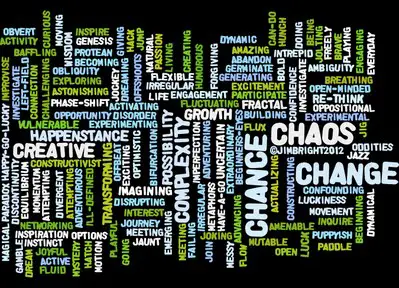|
TRANSLATE THIS ARTICLE
Integral World: Exploring Theories of Everything
An independent forum for a critical discussion of the integral philosophy of Ken Wilber
 David Christopher Lane David Christopher Lane, Ph.D.
Professor of Philosophy, Mt. San Antonio College Lecturer in Religious Studies, California State University, Long Beach Author of Exposing Cults: When the Skeptical Mind Confronts the Mystical (New York and London: Garland Publishers, 1994) and The Radhasoami Tradition: A Critical History of Guru Succession (New York and London: Garland Publishers, 1992). SEE MORE ESSAYS WRITTEN BY DAVID LANE
Information
Field Theory
The Wolfram Conclusion, Koch�s Conjecture,
and Vedral�s Quantum Hypothesis
The Principle of Computational Equivalence, the Non-Reducibility
of Consciousness, and the Universe as Information
David Lane
"Everything Should Be Made as Simple as Possible, But Not Simpler." — Albert Einstein

THREE NEW FILMS ON AN EMERGING FIELD
It seems to happen a few times a year where my somewhat chaotic choice of reading materials coincides in unexpected ways and leads me in new directions. Just recently I re-read Stephen Wolfram�s massive tome (particularly the footnotes which covers nearly 350 pages of small type), A New Kind of Science, which I had first read when it initially came out back in 2002. The book is now free online here.
At the same time I was also re-reading Christof Koch�s delightfully idiosyncratic autobiography, Consciousness: Confessions of a Romantic Reductionist that was released in 2012. What I hadn�t expected was how these two books (separated by a decade) would both propose similar ideas on how to best understand human consciousness.
While both have long championed reductionism (from cellular automata to better grasp computational equivalence to neuronal scaffolding to better understand how self-reflection arises in higher mammals), they have radically altered course in proposing that there are some aspects in nature that are computationally irreducible.
For Wolfram this had led him to conclude that
“. . . In the end the Principle of Computational Equivalence encapsulates both the ultimate power and the ultimate weakness of science. For it implies that all the wonders of our universe can in effect be captured by simple rules, yet it shows that there can no way to know all the consequences of these rules, except in effect just to watch and see how they unfold.”
For Koch, who had worked with the late Francis Crick (of DNA fame) on the neural basis of awareness, this led him to radically alter course and suggest that,
“Consciousness is a fundamental, an elementary, property of living matter. It cannot be derived from anything else; it is a simple substance in Leibniz�s words.”
Now just prior to re-reading these two books I had re-read more closely Vlatko Vedral�s intriguing work on physics as presented in his popular study, Decoding Reality: The Universe as Quantum Information.
What struck me so forcefully was how all three books were coming to similar conclusions, even if from differing disciplines: computer programming, neuroscience, and quantum physics.
I am in the process of writing a longer book on this topic, but I decided that it might prove helpful to myself (and perhaps others) to first make three distinct films (drawn directly from the text themselves) which illuminate this now blossoming field of information theory.
COMPUTATIONAL EQUIVALENCE
Christof Koch
Calvino's Game
|
 David Christopher Lane, Ph.D.
Professor of Philosophy, Mt. San Antonio College Lecturer in Religious Studies, California State University, Long Beach Author of Exposing Cults: When the Skeptical Mind Confronts the Mystical (New York and London: Garland Publishers, 1994) and The Radhasoami Tradition: A Critical History of Guru Succession (New York and London: Garland Publishers, 1992).
David Christopher Lane, Ph.D.
Professor of Philosophy, Mt. San Antonio College Lecturer in Religious Studies, California State University, Long Beach Author of Exposing Cults: When the Skeptical Mind Confronts the Mystical (New York and London: Garland Publishers, 1994) and The Radhasoami Tradition: A Critical History of Guru Succession (New York and London: Garland Publishers, 1992).